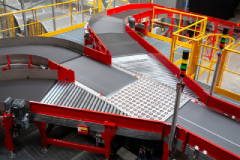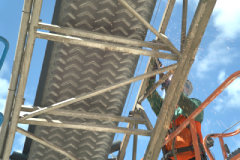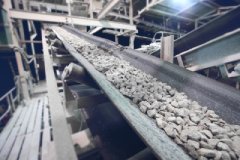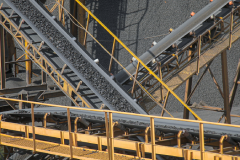Conveyor Maintenance Scheduling
Unplanned downtime due to conveyor failures can result in significant financial losses for businesses. In this blog post, we will discuss the importance of proactive maintenance scheduling for material handling conveyors. We will explore strategies for developing a comprehensive maintenance schedule, including regular inspections, preventive maintenance tasks, and planned downtime for major repairs or upgrades. By implementing a proactive maintenance approach, companies can minimize unexpected failures and ensure uninterrupted conveyor operation, ultimately saving time and money.
A Proactive Approach to Prevent Costly Downtime
In the fast-paced world of manufacturing and logistics, conveyor systems are the unsung heroes that keep operations running smoothly. These workhorses tirelessly transport goods from one point to another, facilitating the efficient movement of materials in warehouses, factories, and distribution centers. However, like any other machinery, conveyors are prone to wear and tear, and if not properly maintained, they can become a source of unexpected downtime and financial losses for businesses.
Unplanned downtime due to conveyor failures is not just an inconvenience; it can be a major setback for a company. The cost of downtime goes far beyond the immediate repair expenses. It includes lost production, missed delivery deadlines, overtime labor costs, and potential damage to the company's reputation. To avoid these costly consequences, a proactive approach to conveyor maintenance scheduling is essential.
The Importance of Proactive Maintenance
Proactive maintenance is all about staying one step ahead of potential issues. Instead of waiting for a conveyor to break down and then reacting to the problem, companies should take a proactive stance by implementing a structured maintenance schedule. This approach involves regular inspections, preventive maintenance tasks, and planned downtime for major repairs or upgrades. If you don’t know where to begin you can contact us to have our Solutions Specialists come out to your facility to walk your system and give you some recommendations. Let's delve into why this approach is crucial.
Cost Savings
The primary motivation behind proactive maintenance is cost savings. When you schedule regular inspections and maintenance tasks, you can identify and address minor issues before they escalate into major problems. Small fixes are often more affordable and less time-consuming than dealing with a full-blown conveyor breakdown.
Increased Equipment Lifespan
Regular maintenance not only prevents breakdowns but also extends the lifespan of your conveyor equipment. By replacing worn-out components and keeping the system in optimal condition, you can delay the need for expensive replacements, ultimately saving your business money.
Improved Reliability
A conveyor system that undergoes routine maintenance is a reliable one. It operates consistently, reducing the likelihood of sudden failures and production stoppages. This reliability contributes to smoother operations and increased customer satisfaction.
Developing a Comprehensive Maintenance Schedule
Creating a comprehensive maintenance schedule for your conveyor system requires careful planning and consideration. Here are the key steps to develop an effective maintenance plan:
Conduct Regular Inspections
Regular inspections are the foundation of a proactive maintenance schedule. These inspections should cover various aspects of the conveyor system, including the belt, rollers, motors, and controls. Inspectors should be trained to identify signs of wear, damage, misalignment, or any other issues that may affect performance.
Perform Preventive Maintenance Tasks
Based on the findings of your inspections, schedule preventive maintenance tasks. This can include cleaning, lubrication, and replacing worn components like belts, bearings or idlers. Create a checklist of these tasks and ensure they are carried out on a regular basis.
Plan for Downtime
Recognize that there will be times when the conveyor system needs more extensive maintenance or upgrades. Plan for these periods of downtime in advance to minimize disruption to your operations. Consider conducting major maintenance during planned shutdowns or during periods of reduced production.
Keep Detailed Records
Maintain detailed records of all maintenance activities, including inspections, repairs, and component replacements. This data will help you track the performance of your conveyor system over time and make informed decisions about when to replace or upgrade equipment.
Train Your Team
Invest in training for your maintenance team to ensure they have the knowledge and skills necessary to perform their tasks effectively. Well-trained personnel are more likely to spot potential issues and address them promptly. We at Davis Industrial can help you in that training.
Hiring a Proven Reliable Conveyor Contractor
In the quest for a proactive conveyor maintenance strategy, partnering with a reliable conveyor contractor can be a game-changer. These experts bring a wealth of knowledge and experience to the table, helping you ensure that your conveyor system is in top-notch condition. Here's why engaging a reliable conveyor contractor can make a significant difference:
Expertise and Experience
A seasoned conveyor contractor has likely dealt with a wide range of conveyor systems and maintenance challenges. Their expertise can be invaluable in identifying potential issues and recommending the most effective maintenance strategies. They can also offer insights into industry best practices and the latest technologies for conveyor maintenance.
Specialized Tools and Equipment
Maintaining conveyors often requires specialized tools and equipment, which can be expensive to acquire and maintain in-house. A reliable contractor will have access to these tools, ensuring that maintenance tasks are performed accurately and efficiently.
Customized Maintenance Plans
A trustworthy conveyor contractor doesn't provide a one-size-fits-all solution. Instead, they work closely with your team to develop a customized maintenance plan tailored to your specific conveyor system and operational needs. This ensures that your maintenance efforts are focused on what matters most to your business.
Timely Response to Emergencies
Despite the best preventive measures, emergencies can still happen. A reputable contractor will be prepared to respond quickly to unexpected breakdowns, minimizing downtime and mitigating potential losses.
Compliance and Safety
Conveyor systems must meet safety and regulatory standards. A reliable contractor will be well-versed in these requirements and can help ensure that your conveyor system remains compliant, reducing the risk of accidents or fines.
Long-Term Partnerships
Building a long-term partnership with a proven contractor can provide peace of mind. You can rely on their consistent support, maintenance, and expertise, knowing that they are committed to the success of your conveyor system.
When choosing a conveyor service company, be sure to consider their track record, customer references, and the range of services they offer. Look for a contractor who not only excels in maintenance but also provides support in system design, installation, and upgrades. Additionally, a reputable contractor should boast a large inventory selection of high-quality products that they can readily provide. This not only ensures a swift response to your needs but also reflects their commitment to offering comprehensive solutions for all your industrial requirements. A well-stocked inventory showcases their dedication to delivering excellence and streamlining your operations, making them a valuable partner in your industrial endeavors.
Elevate Your Maintenance Strategy with a Trusted Conveyor Contractor
Incorporating a trusted conveyor contractor into your proactive maintenance strategy can streamline your maintenance efforts, improve the reliability of your conveyor system, and ultimately contribute to the overall success of your business. Together with your contractor, you can keep your operations running smoothly and avoid costly downtime. This partnership not only enhances the efficiency of your maintenance plan but also provides access to specialized expertise and tools that can make a significant difference in the longevity and performance of your conveyor system.
Conveyor maintenance scheduling is not just a cost-saving measure; it's a strategic investment in the reliability and longevity of your conveyor system. By adopting a proactive approach, companies can prevent costly downtime, improve equipment reliability, and ultimately save both time and money. Don't wait for your conveyors to break down; start planning your maintenance schedule today and keep your operations running smoothly. Your bottom line will thank you for the foresight and diligence in maintaining the lifeblood of your material handling operations.







